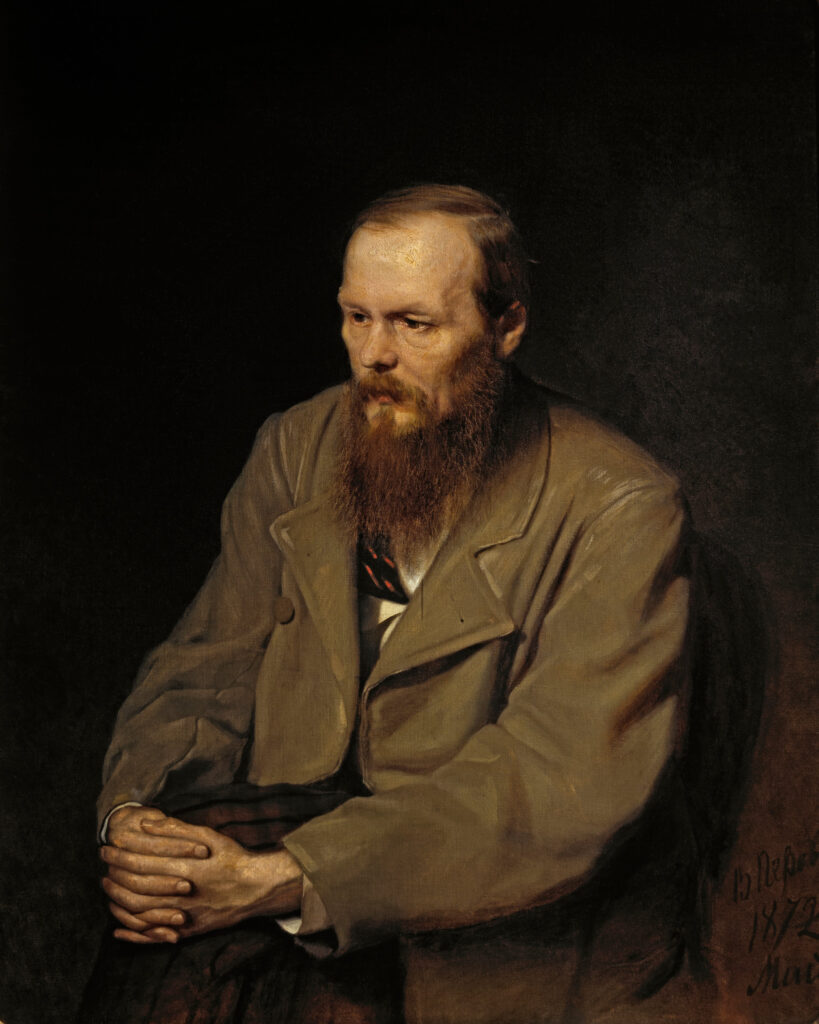
Summary of White Nights by Fyodor Dostoevsky
White Nights Synopsis
White Nights (“Belye Nochi” in Russian) is one of Fyodor Dostoevsky’s earlier works, published in 1848. This short story showcases Dostoevsky’s remarkable ability to capture the psychological complexity of his characters within a concise narrative.
Told in a first person narrative, the nameless narrator lives alone in St. Petersburg. He suffers from intense loneliness, alienation and longing. He meets and falls in love with a beautiful woman named Nastenka. But, she does not love him back.
In the end, Nastenka reunites with her long lost lover, leaving the narrator alone once more.
The ‘White Nights’ Phenomenon
The title “White Nights” refers to a natural phenomenon experienced in St. Petersburg during the summer months, particularly in June, when the sun never fully sets.
This creates a mysterious twilight that blurs the line between day and night. Dostoevsky deliberately chose this dreamy, liminal setting to mirror the Dreamer’s psychological state – a man caught between reality and fantasy, solitude and connection. The ethereal atmosphere of the white nights serves as the perfect backdrop for a story about fleeting encounters and ephemeral emotions.
Book Information
Author: Fyodor Dostoevsky
Genre: Classics, Romance
Themes: Loneliness, Fleeting Love, Dreams vs. Reality, Emotional Vulnerability
Tone: Romantic, Melancholic, Introspective
Published: 1848 (Published in English in 1918)
Page Count: 128 (Penguin Classics)
Character Breakdown
Main Characters
The Narrator (“The Dreamer”) – A lonely man who lives in St. Petersburg. He escapes reality by indulging in dreams and fantasies. He is nameless, and is referred to as The Dreamer. This highlights the archetypal character of a man who escapes the mundane by living in a world of illusion.
Nastenka – A compassionate young woman who waits for her long lost lover in the form of The Lodger or the Young Man. She develops a brief but relatively deep connection to “The Dreamer” before she reunites with her soon-to-be husband.
The Lodger/Young Man – Nastenka’s lover who disappeared for an entire year. His presence is small in the story, but his influence over the plot and character motivations is profound.
Supporting Characters
Grandmother – The guardian of Nastenka during her childhood. She is blind and controlling, having literally tied Nastenka to her own hip for safety.
Matryona – The Dreamer’s old, unsociable maid. She cares for him while serving as a symbol. She represents the Narrator’s future, as an old man who will age without having a partner by his side.
Plot Summary
The short story takes place over four nights and a morning.
First Night
“It was a wonderful night, such a night as is only possible when we are young, dear reader. The sky was so starry, so bright that, looking at it, one could not help asking oneself whether ill-humoured and capricious people could live under such a sky. That is a youthful question too, dear reader, very youthful, but may the Lord put it more frequently into your heart!”
The narrator begins by describing his experience of walking through St. Petersburg. He expresses his feelings of distress. The people he usually sees on his walks are gone, far away from the city into the countryside. He presents himself as a reactionary man. If the people walking by were joyful or sad, then so was he. Not being able to see the faces he always recognized made him feel completely alone. The narrator lives with his old and unsociable maid Matryona. Yet, it makes no difference to how he feels. He is completely alone.
The narrator begins telling the tale of his encounter with Nastenka. One summer night, he meets a crying woman. After saving her from a drunkard, the two characters spark conversation.
The narrator tells Nastenka about his feelings of loneliness. He talks about his lack of courage with regards to speaking to women. She reassures him as they continue their walk through the city. They spend the night together talking about themselves. The narrator talks about his dream of having a woman in his life who loves him.
Once they finally reach Nastenka’s door, he asks if he will ever see her again. They both say that they will be at the same spot tomorrow, the place where they first met. If the two happen to meet there tomorrow, Nastenka will tell the narrator her story and be with him. The only condition is this: the narrator must not fall in love her no matter what.
Second Night
“The dreamer—if you want an exact definition—is not a human being, but a creature of an intermediate sort.”
The two meet again and talk about their personal lives. The narrator speaks very little of himself, saying that he has lived no life at all due to his loneliness. He says the he is a “dreamer”, dreaming up a life that he has always wanted before his own eyes. To him, reality is boring. The narrator lives in his own world of dreams. He fantasizes about all things from befriending poets to having a woman in his life.
Nastenka tells the narrator that she will be his friend. She tells him the story of her life, speaking of the restricted upbringing she had due to her strict and blind grandmother. The house the two lived in contained a room that served as a lodging. This is how she met a particular young man. Nastenka is cared for by the young man, who helps her to develop a reading habit and brings her to the opera.
On the night that the young man is to leave the lodging, Nastenka urges him to marry her. He tells her that he does not have the money to fund such a thing, but insists that he will return to her in a years time.
Nastenka reveals to the narrator that a year has now passed. She has not received a single letter from the young man in this time.
Third Night
Despite the boundaries set by Nastenka, the narrator has developed feelings. Regardless, he helps her write and send off a letter to her lover while hiding his own feelings for her. Waiting for a sign from the young man, Nastenka becomes more fond of their relationship.
Nastenka is completely unaware of the narrator’s feelings for her. Yet, she admits that she loves him because he hasn’t fallen in love with her. Full of despair, the narrator begins to feel alienation from Nastenka.
Fourth Night
Nastenka is losing hope because she knows that the young man is in St. Petersburg, but hasn’t contacted her. While trying to comfort her, the narrator breaks down. He confesses his feelings for her. Nastenka becomes confused as the narrator says that the two should never meet again. Nastenka insists that the narrator should stay. She suggests that they could have a romantic relationship one day in the future. This fills the narrator with immense hope.
As they continue walking through the city, the two meet a young man; Nastenka’s lover. She jumps into his arms, before leaving the narrator with a kiss.
Nastenka and the young man walk into the white night, leaving the narrator with a broken heart. He is alone once again.
The Morning
“May your sky always be clear, may your dear smile always be bright and happy, and may you be for ever blessed for that moment of bliss and happiness which you gave to another lonely and grateful heart. Isn’t such a moment sufficient for the whole of one’s life?”
The morning is an afterword about a letter that the narrator has received from Nastenka. She apologizes for hurting him and that she will forever be grateful for his help and compassion. She plans marrying within a week and hopes to see the narrator at the wedding.
Reading the letter, the narrator begins to cry. Matryona interrupts him, causing him to wonder. Will he too grow old without a partner? Yet, he does not give up hope, as the story comes to an end.
Theme Analysis
Loneliness
The narrator is desperate for a meaningful human relationship. Dostoevsky’s White Nights provides an insight into the mind of a man who is yearning for love.
Fleeting Love
Dostoevsky highlights the transient nature of love. We can see the pain that comes with unrequited love through the character of the narrator. His feelings for Nastenka showcase the perishability of human relationships.
Dreams vs. Reality
The narrator is a self-proclaimed “dreamer”. He would much rather conjure up a false reality than face the truth of being itself. The narrator would rather live in a world of delusion.
Emotional Vulnerability
Nastenka acts as a vehicle for the narrator to express his feelings. He struggles, but he manages to open up and talk about his feelings to the longing Nastenka.
Conclusion
White Nights is a terrific short story and a quick read. It is easy to comprehend and does a great job at exploring the depth of the human psyche.
Love is transient in this tale. Dostoevsky explores human feelings like love, despair and longing. He also tackles complex themes like loneliness and dream-like delusion. Although not his most lengthy piece of work, the impact that the story leaves on the reader is profound.
After reading this book, one cannot help but ask an important question. Should we be dreaming our life away, within a world of mundaneness, pain and upsetting truths? Why not live in the world you want to live in inside your head?
Dostoevsky’s White Nights, though less known than his major novels like Crime and Punishment or The Brothers Karamazov, demonstrates many of the themes that would later define his literary legacy.
Frequently Asked Questions About White Nights
What are the “white nights“ in St. Petersburg? The “white nights” are a natural phenomenon in St. Petersburg, Russia, where the sun doesn’t fully set during summer months due to the city’s northern latitude. This creates a continuous twilight that inspired Dostoevsky’s setting.
Is White Nights based on a true story? While not directly based on a specific true event, White Nights likely draws from Dostoevsky’s own experiences of loneliness and unrequited love during his time in St. Petersburg. The emotional authenticity of the tale suggests personal inspiration.
What is the meaning of ‘Belye Nochi’? “Belye Nochi” is simply the Russian translation of “White Nights.” The phrase refers both to the natural phenomenon of continuous twilight in northern regions during summer and metaphorically represents the dreamlike state of the protagonist.
More Wisdom Here
Like mini-essays? Here’s why you should not be like the lonesome dreamer.
Obsessed with literature, reading, and everything books? Explore more timeless works and literary insights here.
Looking for inspiration that lasts? Don’t miss out on our latest posts at Timeless Wisdom For Modern Living—where ideas, knowledge, and wisdom can solve your problems.
Want even more insights? Stay updated and connect with us on X for the latest knowledge and inspiration. Visit our page here.
